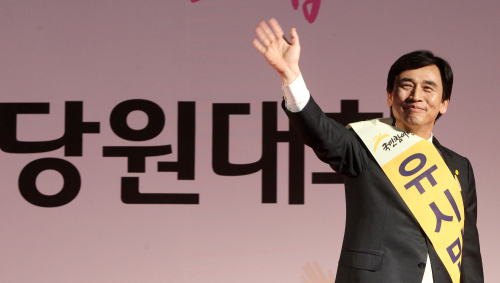Rhyu Si-min, a loyal supporter of the late President Roh Moo-hyun and one of the nation’s most influential liberal politicians, was elected chief of a minority left-leaning party over the weekend, taking a step toward his likely goal to become president in 2012.
Rhyu, who served as welfare minister under Roh and is especially popular among the progressive younger generation here, will likely seek an alliance among diverse opposition parties here, a move that will remap the political landscape ahead of the presidential and the parliamentary elections in a year’s time.
Rhyu, 52, was the only candidate to run for chairman of the People’s Participation Party and received nearly 97 percent support from party members.
Being a small party with a brief history, the PPP has had even major political parties wary of its influence due to its founding members who were Roh’s most ardent supporters. South Koreans have a soft spot in their hearts when it comes to the late president who leapt to his death amid a bribery investigation that many believe was politically motivated. Established last year, the PPP is currently a non-negotiating bloc in the parliament.
 |
Rhyu Si-min waves to supporters at the convention of the People’s Participation Party in Suwon, Gyeonggi Province, Saturday.(Yonhap News) |
“Let’s not think President Roh Moo-hyun failed or gave up. We can start over anew on the very spot that he fell,” Rhyu said during his acceptance speech, pledging to secure at least 20 parliamentary seats in the general elections next year to become a negotiating group in the National Assembly.
“The progressive, reform-minded parties must together have at least 180 seats in the parliament,” the new party leader added, indicating his ambition to consolidate the leftist blocs ahead of the big elections next year.
Rhyu also pledged to focus on resolving the polarization of wealth and regional development, and work on improving the rights of temporary workers, accentuating his longstanding progressive and welfare-focused views.
While Rhyu’s victory may, in the long-run, threaten the conservative ruling party’s bid to take power again in 2012, it is seen as more of an immediate threat to Sohn Hak-kyu and his main opposition Democratic Party.
With the April 27 by-elections as the first big test to prove his capacity, Rhyu will likely launch an internal competition with Sohn to secure general support from the leftist political groups here.
Sohn, also a strong presidential hopeful, will feel more pressured to successfully lead the April by-elections and the parliamentary elections next year to eventually become the sole left-wing candidate to run in the big race, analysts say.
On the surface, the two politicians have both pledged to cooperate for the opposition bloc’s victory in the upcoming by-elections by wielding single candidate for critical regional chief positions.
Sohn, a former member of the conservative Grand National Party, enjoys steady support from the middle-class and middle-age groups here as a moderate-liberal politician. Rhyu, on the other hand, has had continuous progressive attitudes that led to many uproarious fallouts with the conservatives.
A graduate of South Korea’s top Seoul National University, Rhyu worked as a newspaper journalist before being elected to the Assembly in 2002.
A former student activist against the Chun Doo-hwan military regime, Rhyu is also an author of several bestselling books based on his main interests of economy, balanced regional development and distribution of wealth.
By Shin Hae-in (
hayney@heraldcorp.com)








![[Today’s K-pop] Blackpink’s Jennie, Lisa invited to Coachella as solo acts](http://res.heraldm.com/phpwas/restmb_idxmake.php?idx=644&simg=/content/image/2024/11/21/20241121050099_0.jpg)